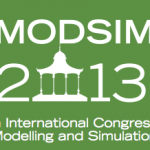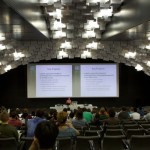Global change and rising pressure on the environment are having increasingly visible impacts on the sustainability of human activities. For example, heat waves seem to be more and more frequent. It is essential to be able to forecast the likely size and impact of these and other extreme events such as droughts and major windstorms if we are to adapt to them and attempt to mitigate their future effects. Continue reading
Category Archives: Climate System
he ARC Centre of Excellence for Climate System Science will host its 3rd annual winter school on June 16-20, 2014 in the Research School of Earth Sciences at the Australian National University. The 2014 winter school theme is Geophysical Fluid Dynamics. … Continue reading
In this talk an overview is given on multirate time integration methods developed over the years for the integration of the compressible Euler equation and advection-diffusion-reaction equations. Physical and chemical processes in the atmosphere occur on different time scales ranging … Continue reading

We are pleased to announce that the 20th International Congress on Modelling and Simulation (MODSIM2013) will be held at the Adelaide Convention Centre in Adelaide, South Australia, from Sunday 1 to Friday 6 December 2013. ASOR (the Australian Society for Operations Research) and … Continue reading

APPLICATIONS ARE NOW OPEN The AMSI Summer School is an exciting opportunity for mathematical sciences students from around Australia to come together over the summer break and develop their skills and networks. Over the four weeks students take innovative courses … Continue reading
ERC NUMERIWAVES Seminar New analytical and numerical methods in wave propagation Tarmo SOOMERE, Tallinn University of Technology, Tallinn, Estonia, Institute of Cybernetics at TUT, Head of Wave Engineering Laboratory, Estonian Academy of Sciences CHANGING WAVE CLIMATE IN THE BALTIC … Continue reading
This workshop brings together mathematicians and statisticians, whose research expertise is relevant to investigating threshold behaviour in complex environmental systems, with the climate scientists and ecologists who exploit mathematical modelling in their research on tipping phenomena.
It is a Chinese curse that you should ‘live in interesting times’. These are times when things are changing quickly, and often not for the better. But why do we have both boring times when nothing much happens and interesting … Continue reading
Teach Networks to Teenagers
This is an article about outreach efforts to teach networks to students of age 13-16 in England. Supplementary teaching materials are available, too. Link to the abstract and article Download supplementary materials (.zip file)
BCAM-Basque Center of Applied Mathematics, in collaboration with the Chair of Scientific Culture of the University of the Basque Country and the Alliance of Technological Centers IK4, invite you to the public lecture M4TEMOZIOA Matematikaren Hitzordua I Cita con las … Continue reading
CliMathNet Conference 2013 Continue reading
This is an ICTS-TIFR program with the basic objective of bringing together leading experts in modelling the dynamics of geophysical phenomena, to elucidate the challenges, practical considerations and opportunities and review the present state of understanding. Continue reading
This discussion meeting will mainly cover the following topics: (i) Mathematical theory of tropical meteorology; (ii) Observations and numerical simulations of these phenomena; (iii) Role of clouds and convection in the tropics; (iv) Prediction and data assimilation techniques.
Conceptual Climate Models: MAA-MCRN Short Course at the 2013 JMM
This two-day short course introduces conceptual models of the Earth’s climate system. The first day is devoted to Energy Balance Models (EBMs): differential equations which express the physical law of energy conservation in mathematical terms. The second day is devoted … Continue reading

IIASA’s annual 3-month Young Scientists Summer Program (YSSP) offers research opportunities to talented young researchers whose interests correspond with IIASA’s ongoing research on issues of global environmental, economic and social change. From June through August accepted participants work within the … Continue reading
Creating usable models for the sustainability of ecosystems has many mathematical challenges. Ecosystems are complex because they involve multiple interactions among organisms and between organisms and the physical environment, at multiple spatial and temporal scales, and with multiple feedback loops … Continue reading
Tom Pfaff’s Sustainability Materials for Mathematics
Materials are available for mathematics courses (mostly Calculus I, Statistics, & Differential Equations) covering a variety of sustainability related topics. Tom Pfaff’s Sustainability Materials Sustainability Math Resources Website
NASA SpaceMath – Problems in Earth Science
SpaceMath@NASA has created a number of individual math problems for grades 5-12 that feature Earth science themes. This webpage is the archive of these problems – each is given by its title, content, grade level and math skill, and consists … Continue reading
NASA Remote Sensing Math
With 103 problems designed for middle and high school students, this book covers many topics in remote sensing, satellite imaging, image analysis and interpretation. Examples are culled from NASA earth science and astronomy missions. Students learn about instrument resolution and … Continue reading
NASA Earth Math
With 46 problems tailored for grades 5-9, students explore the simple mathematics behind global climate change through analyzing graphical data, data from NASA satellites, and by performing simple calculations of carbon usage using home electric bills and national and international … Continue reading
We all know something about waves; we’ve seen them in the sea and as ripples on a pond. We know that sound travels to our ears as a wave and that some properties of light can be explained by its … Continue reading
Professor Inez Fung visits South Africa to deliver the third in the international series of MPE2013 Simons Public Lectures. Watch the video of Dr. Fung’s lecture Abstract: Climate models solve the equations for the conservation of momentum, mass, energy, water … Continue reading
This program is being organized as a part of the activities related to the “Mathematics of Planet Earth 2013”. The dynamics of geophysical phenomena are multi-scale in nature and the interaction between different scales makes the flow complex. Therefore, the … Continue reading
MCRN Mathematics and Climate Annotated Reading Lists
MCRN Annotated reading lists: Each reading list is designed to provide an introductory guide to one area of climate science through its literature. They can be used for independent study, or as the foundation for upper division and graduate reading courses. … Continue reading
AMS-ASA-MAA-SIAM Math Awareness Month
April is Math Awareness Month in the US! Check out the essays, posters and related materials for 2013 and previous years‘ themes, including: 2013 – Mathematical and Sustainability 2011 – Unraveling Complex Systems 2009 – Mathematics and Climate 2008 – … Continue reading
This workshop is a satellite activity of the 2013 Mathematical Congress of the Americas (MCA2013). The workshop will bring together about 40 young researchers, mainly from Latin America and the Caribbean and a dozen distinguished scientists, each of which will give several lectures on a chosen topic. Continue reading
The aim of the conference is to bring together scientists from three areas as diverse as Earth Sciences of fluid phenomena, Non-equilibrium Statistical Mechanics and the Theory of Extreme Events for dynamical systems. Though they have historically common roots and … Continue reading
Dr. Emily Shuckburgh, British Antarctic Survey, visited the San Francisco Bay Area for the second MPE2013 Simons Public Lecture. Watch the video of Dr. Shuckburgh’s lecture Abstract: The signs of disruption to our climate are all around us. California has … Continue reading
The organisers will present a coordinated workshop around a coherent theme designed for an intended audience which are graduate students and interested researchers from and around Africa. Continue reading
Data assimilation (DA) aims at determining and predicting the state of a dynamical system as accurately as possible by combining heterogeneous sources of information in an optimal way. The mathematical problem of DA is both fundamental in that it aims … Continue reading
Fields Institute program on the Mathematics of Oceans, that is to take place in the year 2013 as a part of the initiative for the Mathematics of Planet Earth.
There are three principal themes for this program:
(1) nonlinear ocean wave dynamics, including extreme wave dynamics such as rogue waves and tsunamis,
(2) oceanic circulation and ocean-atmosphere interaction, including global scale phenomena such as the meridional overturning circulation and currents such as the Gulf Stream, mesoscale processes described by quasi-geostrophic flows, as well as highly nonlinear submesoscale processes, including their role in the stability of the earth’s climate, and the impact of their variations; and
(3) wave interactions and turbulence, including statistical descriptions of ocean wave spectra and its role in predictions of sea state and weather. Continue reading
The water wave problem is a computationally difficult yet crucially important problem in applications. The difficulties arise mostly from its free boundary (the water surface) nature. The boundary is unknown a priori, and the boundary conditions for the fluid equations are nonlinear. The workshop shall focus on the inviscid problem (which is often physically reasonable) and which renders the equations conservative (Hamiltonian). This simplification also poses additional numerical issues, since, ideally, the computational methods should also reflect the original conservation properties of the equations. We have chosen six “themes” around which the workshop will be organized. The principal objective will be the cross-fertilization of ideas between computational issues within and amongst these themes. Continue reading
The workshop is intended to be a forum for interaction between statisticians, stochasticists, climate modelers, ocean observers and data assimilators. The goal is to develop observation strategies and design computer experiments to better understand the model and data uncertainties that relate directly to oceans and ocean-related feedback mechanisms. The timing is good in that the studies that form the basis for the fifth assessment report of the IPCC are expected to be finished before the workshop. Continue reading